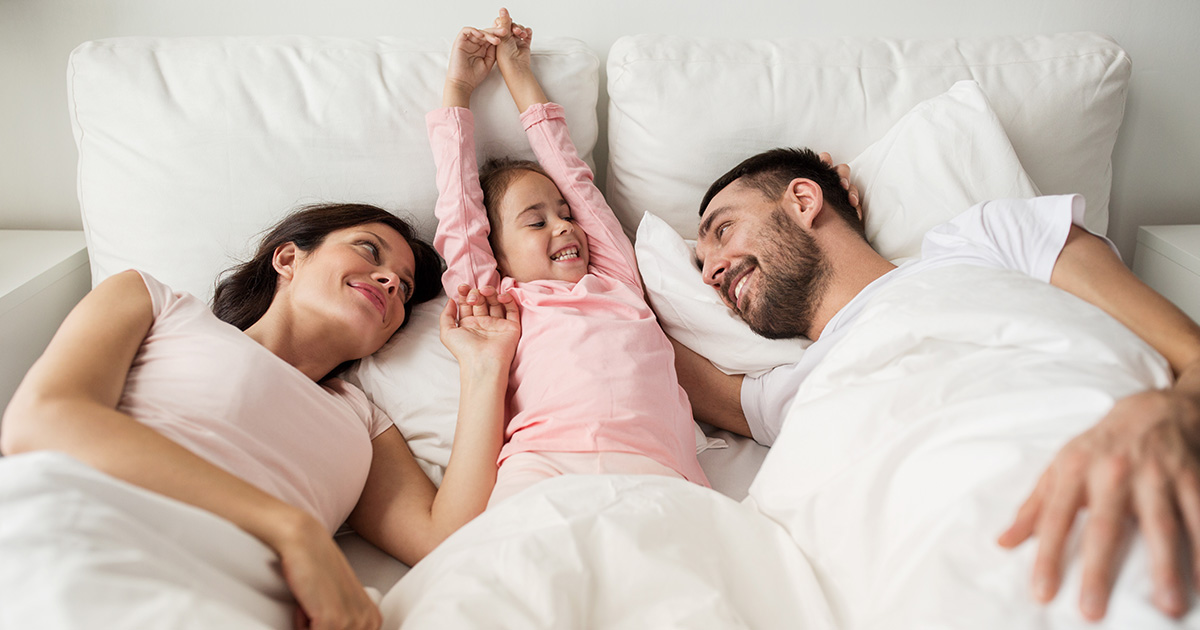The Woolcock Institute of Medical Research

Is it OK to co-sleep with older children?
Many parents won’t admit it, but co-sleeping with older children is a fairly common practice in Australian homes.
“There’s a bit of a stigma, I'm not sure why,” said Woolcock paediatric and adolescent sleep physician Dr Chris Seton. “One of the common reasons why parents come to see us at the Woolcock Sleep Clinic is to ask if co-sleeping is okay and we, of course, say it's okay.
“It's more common than we think because a lot of people don't admit to it. But when we do surveys, in fact, the commonest age for co-sleeping in Australian kids is age nine.”
BED SHARING PROS AND CONS
Speaking on ABC Radio National’s Life Matters program, Dr Seton said there was a misconception that co-sleeping might damage a child’s ability to form their own sleep habits and soothe themselves at night.
“It's rubbish, in the sense that parents shouldn't be worried about that. If you look at global statistics, more kids sleep with their parents than not and there's no long-term evidence of harm either way. That is harm, psychological or other harm, from co-sleeping or psychological harm from not co-sleeping.”
Dr Seton said there was also no cause for concern if a child suddenly wanted to start sleeping with you.
“I think there can be a trigger, but the trigger can just be the loophole in order to do it. Sometimes the trigger is sickness. So, if a child is acutely unwell, parents will often say, ‘you can sleep in our bed for a bit’. But no, the sudden desire to co-sleep is not really a red flag.”
Although there are many positives to co-sleeping, Dr Seton said it can also have its downsides.
“It's great until it's not great. It can cause everyone to lose sleep. So, we see kids that are very restless. When they co-sleep, they helicopter, they spin round the bed, they push their parents, they kick their parents accidentally in their sleep. They lie over the top of their parents. Sometimes they pull their mother's long hair. So, it can have an upside, but it can have a downside as well.”
Want to stay up to date with our research on sleep and respiratory conditions?
Sign up to our monthly newsletter
RECLAIMING YOUR SPACE
According to Dr Seton, children don’t naturally grow out of co-sleeping until their teenage years, however there are strategies to help older children gently transition if parents decide they want to reclaim their sleeping space.
“You'll often get a lot of pushback from kids. And part of it is obviously they want to stay with their parents, but part of it is if they've been co-sleeping for a long time they don't really know that they will sleep okay by themselves. They're psychologically dependent on going to sleep and sleeping with their parents in the same way that they might be dependent on a teddy bear.
“What we do, it's according to age. From age five or six onwards they're responsive to reward therapy. So we work on rewards with the support of parents. It might take a month or two to do it, but it works well.
“And then we've got an in-between stage where we do things like put a thin mattress on the floor in the parents’ bedroom, and we have what's called win-lose contracts.
“We say: ‘You can come into your parents’ bedroom if you wake at night, you can sleep on this thin, not very comfortable mattress on the floor. But you must not wake your parents up when you come in, quiet as a mouse.’
“So what you're giving that child is nearness or closeness to their parents, but without the disruption of the parents’ sleep. And you can integrate that with reward therapy as well.”










